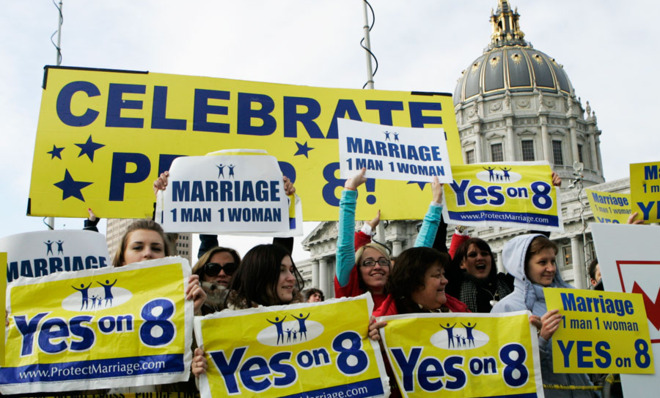The GOP's gay marriage problem isn't going away anytime soon
Conservatives like Mike Huckabee are not going to let the issue go easily, creating a political conundrum for Republicans


A free daily email with the biggest news stories of the day – and the best features from TheWeek.com
You are now subscribed
Your newsletter sign-up was successful
Mike Huckabee isn't happy with the Republican Party.
When it comes to the issue of same-sex marriage, the former governor of Arkansas says his party should "[g]row a spine, show a modicum of knowledge about the way we govern ourselves, and lead, follow, or get the heck out of the way."
The man who did surprisingly well with Republican primary voters in 2008 and is reportedly considering a second presidential bid in 2016 has even threatened to leave the GOP and become an Independent if the party doesn't toughen up on marriage.
The Week
Escape your echo chamber. Get the facts behind the news, plus analysis from multiple perspectives.

Sign up for The Week's Free Newsletters
From our morning news briefing to a weekly Good News Newsletter, get the best of The Week delivered directly to your inbox.
From our morning news briefing to a weekly Good News Newsletter, get the best of The Week delivered directly to your inbox.
Gripping stuff. There's just one problem: it's not entirely clear what, politically, the Republican Party can do about same-sex marriage.
The Supreme Court has yet to hand down a Roe v. Wade–type decision on gay marriage. But it has done the next best thing, letting a slew of lower federal courts strike down state-level laws defining marriage as the union of a man and a woman.
The Supremes themselves have overturned California's popularly enacted Proposition 8 and weakened the federal Defense of Marriage Act.
Huckabee may be exasperated by these developments. But what does he propose as the remedy?
A free daily email with the biggest news stories of the day – and the best features from TheWeek.com
The most obvious solution is a constitutional amendment rolling back the courts' handiwork. Yet the federal marriage amendment failed to garner even plurality support in a Republican-controlled Senate a decade ago, with a purportedly sympathetic president in the White House.
At that time, the defenders of traditional marriage were winning (although warning clouds were on the horizon). Gay marriage continued to fail whenever it was subjected to a popular vote, even in reliably blue states. It only existed where imposed by judges.
No mainstream Democratic presidential candidate would dare support gay marriage, at least not one with serious hopes of winning the White House. (Expect Hillary Clinton to receive frequent reminders of this history over the next two years.)
The last time a former Arkansas governor was in the White House, opposing same-sex marriage was a no-brainer. A 1996 Gallup poll found that only 27 percent of the American people were in favor. By May 2014, that number had skyrocketed to 55 percent.
Today, support for gay marriage is virtually non-negotiable for mainstream Democrats outside the most socially conservative parts of the country. Conservative and Christian subcultures are increasingly becoming the only spaces where there aren't strong taboos against being against gay marriage.
If Huckabee was just one outlier of this broader trend, it wouldn't matter much for the GOP. But he represents a significant minority — around 40 percent — of the American people. His views remain the majority among Republicans and even more so among white evangelical Christians, the party's largest voting bloc.
Not all of these voters share Huckabee's intensity. But there are a few reasons why they may not give up as quickly as expected.
First, social conservatives have been told for decades that Roe is the law of the land and legal abortion isn't going anywhere. While both assertions have remained true for more than 40 years, it is equally true that abortion remains a live political issue and opponents have made strides that once seemed unthinkable in public opinion, legislation, abortion rates, and even the courts.
Just because that happened with abortion doesn't mean it will be the case with gay marriage. But social conservatives can be forgiven for not immediately heeding the same people who told them to shut up and go away on abortion.
Second, opposition to gay marriage will shift for some people from an attempt to uphold traditional social norms to concern about their own religious liberty. Individuals will feel, with varying degrees of justification, that they, their businesses, and their religious institutions are being coerced into recognizing marriages contrary to their faith.
Even back when theirs was a minority position, gay marriage supporters always had one advantage: for many of them, it was an intensely personal issue. It might be about to become personal for their opponents, too.
Third, competing visions of marriage — what some conservatives call the conjugal view of marriage versus equality for all sexual domestic partnerships — may remain politically relevant even if the policy implications dwindle.
For example, the country can divide politically over questions like single motherhood and out-of-wedlock births — think back to the whole Dan Quayle-Murphy Brown culture war moment. Yet even at that time, the policies actually being debated would have just tinkered at the margins. The most consequential of these was probably the family cap for welfare beneficiaries.
People like Mike Huckabee probably won't leave the Republican Party en masse. But they won't leave the American political debate either.
W. James Antle III is the politics editor of the Washington Examiner, the former editor of The American Conservative, and author of Devouring Freedom: Can Big Government Ever Be Stopped?.
